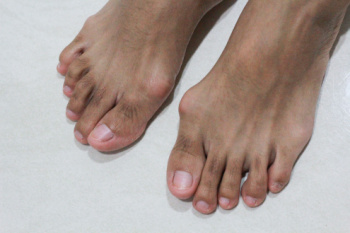
Bunions develop when the bones of the big toe shift, leading to a noticeable, often painful, bump on the side of the toe. People with bunions may first notice a bony protrusion at the base of the big toe, which can gradually enlarge, causing discomfort, especially while wearing narrow or tight shoes. Over time, a bunion may lead to additional symptoms such as redness from friction, calluses, and even stiffness in the toe, which restricts movement. Pain can be persistent or intermittent, especially with weight-bearing activities like walking. The affected toe might also deviate toward the neighboring toes, which can further alter the foot’s shape and increase pain. Bunions are commonly associated with wearing tight-fitting shoes, genetics, or both. A podiatrist can assess the level of severity and provide guidance on appropriate footwear, orthotics, and other treatments. In severe cases, surgery may be recommended to relieve discomfort and restore mobility. If you have a painful bunion, it is suggested that you schedule an appointment with a podiatrist for an exam and treatment.
If you are suffering from bunions, contact Dr. Michael A. Wood of Foot Health Institute. Our doctor can provide the care you need to keep you pain-free and on your feet.
What Is a Bunion?
A bunion is formed of swollen tissue or an enlargement of boney growth, usually located at the base joint of the toe that connects to the foot. The swelling occurs due to the bones in the big toe shifting inward, which impacts the other toes of the foot. This causes the area around the base of the big toe to become inflamed and painful.
Why Do Bunions Form?
Genetics – Susceptibility to bunions are often hereditary
Stress on the feet – Poorly fitted and uncomfortable footwear that places stress on feet, such as heels, can worsen existing bunions
How Are Bunions Diagnosed?
Doctors often perform two tests – blood tests and x-rays – when trying to diagnose bunions, especially in the early stages of development. Blood tests help determine if the foot pain is being caused by something else, such as arthritis, while x-rays provide a clear picture of your bone structure to your doctor.
How Are Bunions Treated?
- Refrain from wearing heels or similar shoes that cause discomfort
- Select wider shoes that can provide more comfort and reduce pain
- Anti-inflammatory and pain management drugs
- Orthotics or foot inserts
- Surgery
If you have any questions, please feel free to contact one of our offices located in Lansing, and Chicago, IL . We offer the newest diagnostic and treatment technologies for all your foot care needs.
